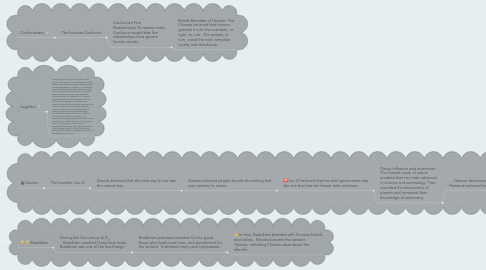
1. Buddhism
1.1. During the first century A.D., Buddhism reached China from India. Buddhism was one of the few foreign
1.1.1. Buddhism promised salvation for the good, those who lived moral lives, and punishment for the wicked. It stressed mercy and compassion.
1.1.1.1. In time, Buddhism blended with Chinese beliefs and values. Nirvana became the western Heaven, reflecting Chinese ideas about the afterlife.
2. Confucianism
2.1. The founder:Confucius
2.1.1. Confucius’s Five Relationships:To restore order, Confucius taught that five relationships must govern human society
2.1.1.1. Beliefs:Mandate of Heaven- The Chinese believed that heaven granted a ruler the mandate, or right, to rule. The people, in turn, owed the ruler complete loyalty and obedience.
3. Legalism
3.1. Dating back to early China, Legalism, also known in the west as Chinese Realism broadly refers to the centralizing Realpolitikal aspect of Chinese philosophy. "Legalism" is concerned almost exclusively with administration and the political system derived thereof; Qin Legalist reformer Shang Yang was quite explicitly anti-Confucian, and "Realists" or "Legalists" more generally scarcely addressed moral or philosophical questions. To advance the material interest of their respective patrons and states, Realist reformers enacted utilitarian economic reforms, and ultimately advised passive absolutist political methodology. In actuality the philosophical corpus that is included under the term Legalism is a syncretism of lengthy origin and breadth, much of which is non-legal, and non-Qin in origin or form, including Shen Pu-hai derived Realpolitikal technique, which would, besides that of history, come to define the study of Realpolitik for post-Qin Emperors in the form of late-synthesizer Han Fei.
4. Daoism
4.1. The founder: Lao Zi
4.1.1. Daoists believed that the best way to live was the natural way.
4.1.1.1. Daoists believed people should do nothing that was contrary to nature.
4.1.1.1.1. Lao Zi believed that the best government was the one that had the fewest rules and laws.
